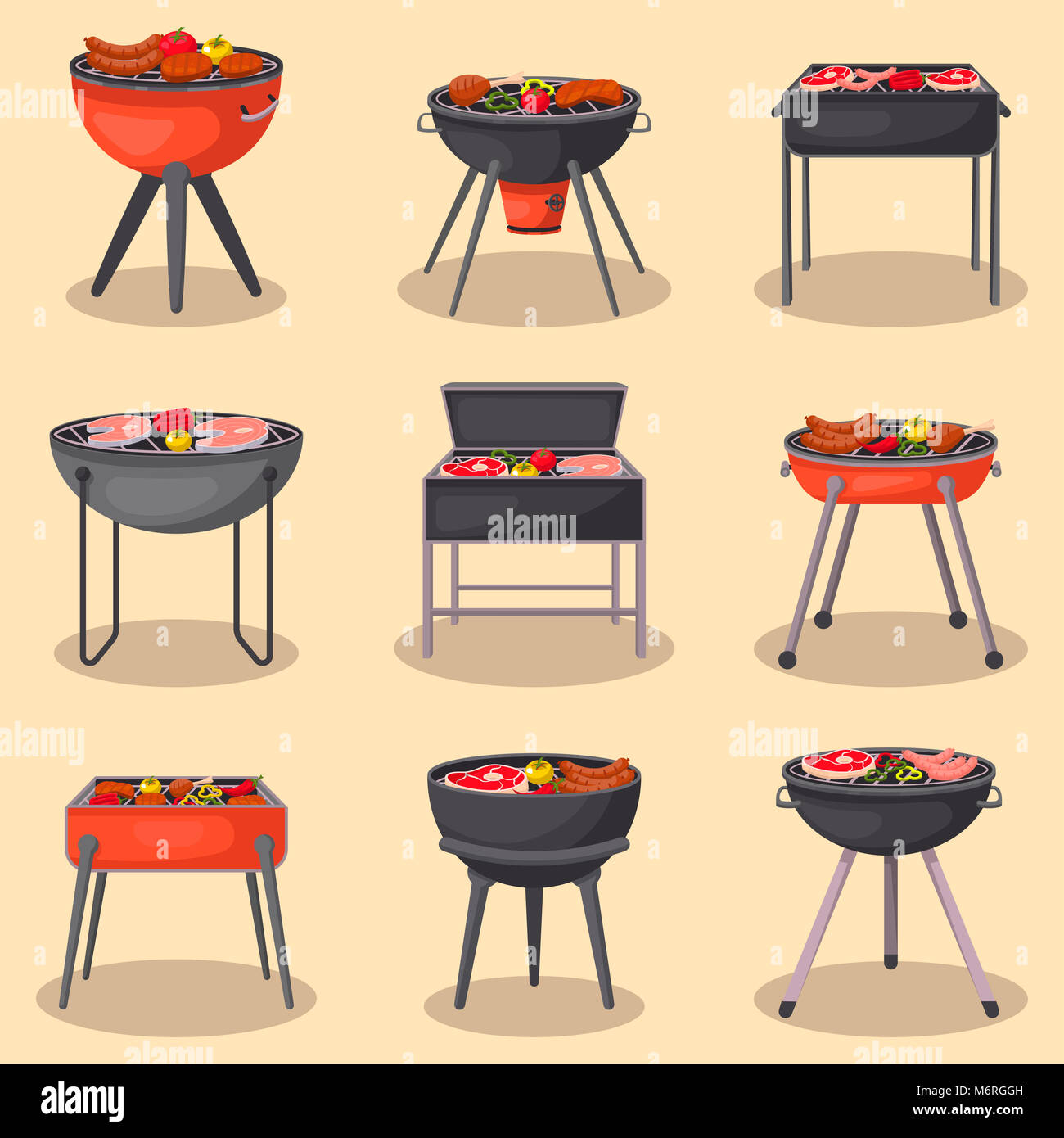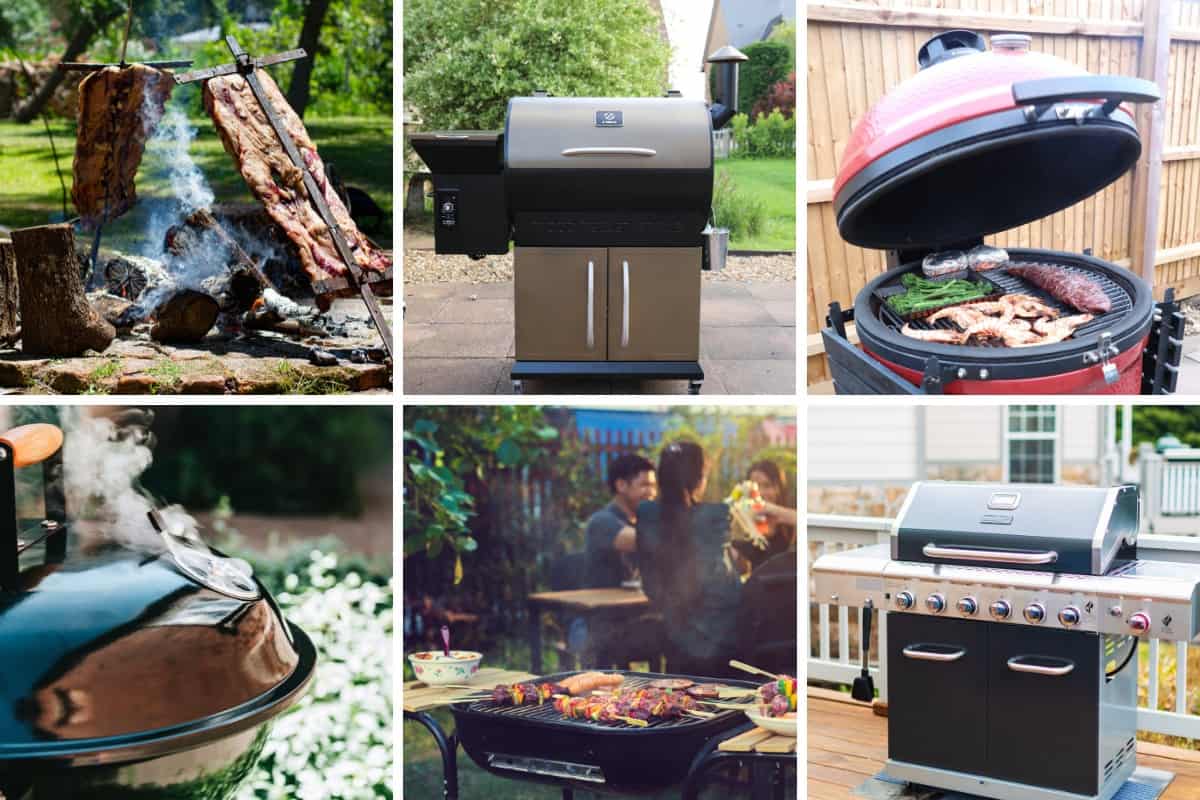When it comes to outdoor cooking, choosing the right grill can significantly enhance your culinary experience. With a variety of grill types available, each offering distinct benefits for different cooking preferences and environments, it’s important to make an informed decision to maximize the enjoyment of your grilling sessions. Let’s take a closer look at the main types of grills, weighing their advantages, challenges, and best use cases.
Charcoal Grills: Traditional Flavor with Intense Heat
Charcoal grills are famous for producing that authentic smoky flavor that grilling enthusiasts cherish. Using either briquettes or lump charcoal, these grills can reach high temperatures, making them a favorite among those who enjoy a classic grilling experience.
Advantages:
- Signature Flavor: Adds a unique, smoky taste that many grilling purists love.
- High Heat: Can reach very high temperatures, ideal for searing meats.
- Portability: Compact and easy to transport, perfect for smaller spaces or outdoor adventures.
- Affordable: Generally less expensive than many other grill types.
Limitations:
- Preheat Time: Can take 20-40 minutes to reach the desired temperature.
- Messy Cleanup: Handling ash and leftover charcoal can be inconvenient.
- Temperature Control: Managing consistent heat can be tricky without advanced techniques.

Gas Grills: Efficient and Quick Cooking
Gas grills, which run on propane or natural gas, are praised for their convenience and efficiency. With fast ignition and precise temperature control, they are perfect for those who want a quick and hassle-free grilling experience.
Advantages:
- Ease of Use: Heats up quickly and is ready to use in minutes.
- Temperature Precision: Simple dial controls allow for fine-tuned heat management.
- Low Maintenance: Less ash and smoke means less cleanup.
- Versatility: Many models feature side burners, rotisserie attachments, and more.
Limitations:
- Flavor Trade-Off: Does not produce the same rich smoky taste as charcoal grilling.
- Higher Price: Typically more expensive, especially when using natural gas.
- Fuel Dependency: Requires either a propane tank or natural gas line, limiting mobility.
Electric Grills: Ideal for Indoor and Small Spaces
Electric grills run on a heating element and are great for indoor cooking or places where open flames are restricted. They’re a popular choice for urban dwellers looking for a convenient, compact grilling option.
Advantages:
- Simple Operation: Just plug in and start grilling—no need for fuel or preheating.
- Indoor/Outdoor Flexibility: Can be used in any setting, year-round.
- Space-Saving: Perfect for apartments or small patios.
Limitations:
- No Smoky Flavor: Lacks the traditional smoky taste found in charcoal or gas grilling.
- Moderate Heat: Doesn’t get hot enough for efficient searing or high-heat cooking.
- Electric Dependency: Needs a power outlet, limiting use in remote areas.

Pellet Grills: Precision and Smoky Flavor Combined
Pellet grills use wood pellets to create smoke and heat, with electronic controls for consistent pellet feeding. These grills provide an excellent balance of smoky flavor and accurate temperature management.
Advantages:
- Distinct Flavor: Produces a rich wood-fired flavor that enhances food.
- Precise Temperature Control: Digital controls allow for fine adjustments, ensuring consistent results.
- Multifunctional: Can serve as a grill, smoker, or even an oven.
Limitations:
- Cost: Typically more expensive than gas or charcoal grills.
- Electric Requirement: Needs electricity to power the pellet feeder and controls.
- Regular Maintenance: Requires periodic cleaning of the pellet hopper and auger.
Kamado Grills: Heat Efficiency and Versatility
Kamado grills, made from durable ceramic, are known for their excellent heat retention. These grills offer versatility, allowing for smoking, baking, and grilling with great efficiency.
Advantages:
- Superior Heat Retention: Ceramic construction maintains heat for even cooking.
- Fuel Efficiency: Requires less charcoal due to its excellent insulation.
- Wide Range of Cooking Options: Ideal for everything from grilling to slow cooking.
- Durability: Built to last, with ceramic materials that stand up to the test of time.
Limitations:
- Higher Cost: Usually pricier than standard charcoal grills.
- Less Portable: Heavy and difficult to move due to the ceramic material.
- Learning Curve: Mastering temperature control can take some practice.
Portable Grills: Convenience for On-the-Go Grilling
Portable grills are designed to be lightweight and easy to transport, making them perfect for camping, tailgating, or grilling in remote locations. They are available in various fuel options to suit different preferences.
Advantages:
- Easy to Transport: Compact and lightweight, ideal for travel.
- Multiple Fuel Choices: Available in charcoal, gas, and electric models.
- Cost-Effective: Generally more affordable than larger, feature-packed grills.
Limitations:
- Limited Cooking Capacity: Smaller cooking surface means fewer items can be grilled at once.
- Heat Control Challenges: Often lacks precise temperature control, making it harder to manage heat levels.
Choosing the Best Grill for Your Needs
The ideal grill depends on your personal cooking preferences, available space, and lifestyle. Here’s a quick comparison:
- Charcoal Grills: Best for those who want authentic smoky flavor.
- Gas Grills: Great for quick, versatile, and easy grilling.
- Electric Grills: Perfect for indoor grilling and tight spaces.
- Pellet Grills: Ideal for wood-fired flavor and precise cooking.
- Kamado Grills: Suited for those who want versatility and efficient heat retention.
- Portable Grills: Excellent for grilling on the move.
Conclusion
Each grill type has its unique set of benefits and limitations, making it essential to choose the one that best suits your grilling style and needs. Whether you value the smoky flavor of charcoal, the convenience of gas, or the precision of pellet and Kamado grills, understanding the strengths of each can help guide you toward the right decision. Select the grill that aligns with your lifestyle to ensure every outdoor cooking experience is enjoyable and satisfying.
